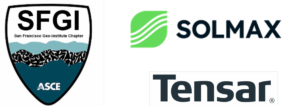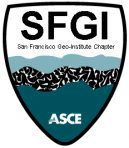
San Francisco Geo-Institute
San Francisco Geo-Institute (SFGI)
For the latest announcements regarding events, dinner meetings, and news, please visit the SFGI LinkedIn Group or sign up for email updates. If you are interested in learning more about SFGI, check out our past events.
About Us
The Geo-Institute (G-I) is a specialty membership organization focused on geo-professionals and the geo-industry. It is one of American Society of Civil Engineers’ eight specialty Institutes. Similarly, SFGI is the local specialty chapter mirroring the goals and purposes of the G-I. The purpose of SFGI is to locally promote an interest in and the general advancement of engineering knowledge in the fields of geotechnical and geoenvironmental engineering, and related earth sciences.
Our geo-professionals work to improve the built environment, prevent the loss of life and property from natural and man-made hazards, and construct sound and reliable engineered facilities and structures.
UPCOMING EVENT

Join us for Happy Hour!
Wednesday, October 16th, 2024
5:30 – 8:30 PM
$30 – General admissions
Free – Students
REGITER
** Registration Includes drinks and appetizers **
SFGI is hosting a happy hour at Langan’s SF Office! Come join us for happy hour where you’ll meet fellow professionals and students from the Bay Area geotechnical and ground engineering community for an evening of drinks and socialization. This is an excellent opportunity to network and catch up in a fun, casual setting. In addition, you will also be learning from Solmax and Tensar about geosynthetics!
Solmax
Solmax is a world leader in sustainable construction solutions, for civil and environmental infrastructure. Its pioneering products separate, contain, filter, drain and reinforce essential applications in a more sustainable way – making the world a better place. The company was founded in 1981, and has grown through the acquisition of GSE, TenCate Geosynthetics and Propex. It is now the largest geosynthetics company in the world, empowered by more than 2,000 talented people. Solmax is headquartered in Quebec, Canada, with subsidiaries and operations across the globe.
Tensar
Tensar is a world-leading provider of ground stabilization and soil reinforcement solutions. For over 50 years, Tensar’s innovative products have benefited thousands of civil and construction projects around the world. Learn how our award-winning design software Tensar+ and our California based team furnish support and advice to:
- Provide solutions for challenging ground stabilization applications.
- Deliver projects more cost effectively by providing initial and long-term savings.
- Create more efficient project timelines by reducing materials quantities and impacts of weather on construction schedules.
- Meet sustainability goals by reducing carbon footprint and reducing community impacts.
Location:
Langan (San Francisco)
135 Main Street, Suite 1500, San Francisco CA 94105
Date and Time:
Wednesday, October 16th, 2024
5:30 – 6:30 pm: Social
6:30 – 7:00 pm: Presentation by Solmax and Tensar (15 minutes each)
7:00 – 8:30 pm: Social
REGISTER
**Send us an email at ascesfgeo@gmail.com to get involved!**


